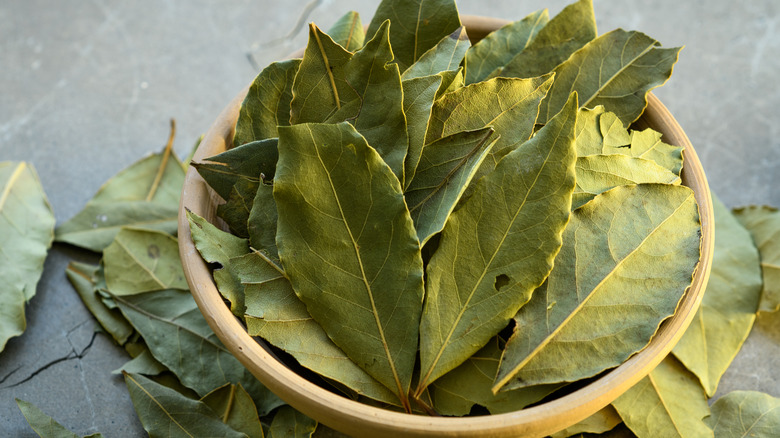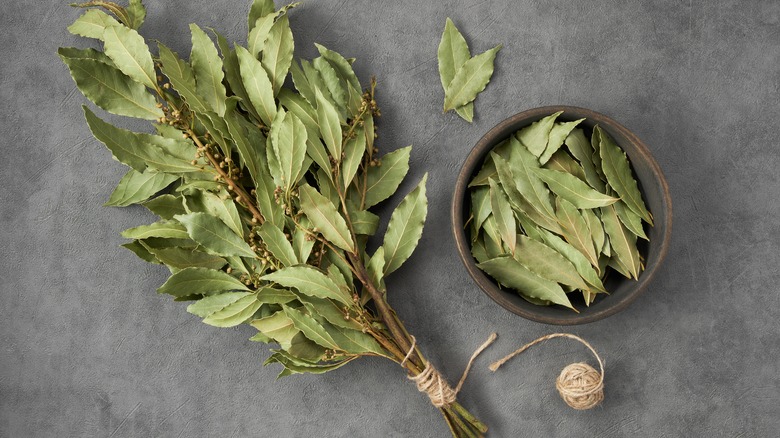Ina Garten Can't Tell Whether Bay Leaves Work, Either
Bay leaves spice up some of the most delicious savory dishes out there. Used in making everything from roast turkey to ravioli and found across Indian and Caribbean cuisines, bay leaves seem like an essential tool in anyone's kitchen cupboard. Even some American chains like Chipotle slip some bay leaves in their recipes. But are the aromatic leaves as important as they seem?
When infused with bay leaf flavor, a recipe can take on "mild, green, and slightly clove-like" notes (via Cook's Illustrated). They're commonly used for meats and soups, but the most enterprising chefs can spin them into desserts as well. And while many cooks among us probably keep our bay leaves in the container stashed away in the pantry, it's advised to either use fresh ones or freezer-stored leaves rather than months-old ones out of the container.
But the question many of us have, as we add a bay leaf or two to soup only to fish them out again later, is whether or not they make a difference. Do bay leaves actually add any flavor? It's not just us; culinary legend and cookbook author Ina Garten can't tell whether bay leaves work, either.
Ina Garten dissed bay leaves on national radio
In conversation with David Remnick for "The New Yorker Radio Hour," the Barefoot Contessa dished on her affinity for scarves, the ease of making a roast chicken, and, most importantly, the usefulness of bay leaves. Remnick relayed to her the age-old question by a listener in Berkeley, California — "Are bay leaves BS?" — and Garten admitted that she isn't sure.
"I really don't know the answer to this, and I will say that I always also wonder whether bay leaf makes a difference," the seasoned chef answered. "There are a couple of things that I use bay leaves in, and I've always wanted to make them without the bay leaves to see if it made a difference, and they never have, so I'm not sure."
Garten is clearly on the fence about their effectiveness. At the very least, if even she can't tell whether they're useful, it shouldn't seem like the end of the world if you have to make a soup or meat dish and find you're out of bay leaves. But do they actually affect the quality of your food? We consulted some experts to find out.
So do bay leaves actually work?
Bay leaves add aroma and subtle flavors to dishes. Because they aren't supposed to be eaten directly, even being removed after dishes are finished cooking, it's easy to assume they don't add much. But many chefs are all in when it comes to using bay leaves, per The Awl, noting that even the iconic Anthony Bourdain once said, "they are important." If you're on the fence, try using fresh bay leaves or frozen ones before writing them off altogether.
Alex Delany at Bon Appétit is a fervent supporter of the bay leaf. "When the herb is infused into water, broth, or another cooking liquid, an almost minty flavor (somewhere between spearmint and menthol) develops, with subtle hints of black pepper and Christmas tree pine," he wrote. "They add a subtle bitterness that keeps heavy soups and stews from being so, well, heavy." If you're not on board the bay leaf train, he notes, it's probably because you're using the relatively weaker dried bay leaves rather than fresh ones.
Chefs consulted by TODAY Food said the leaf imparts wood, citrus, and pepper notes, adding that the flavors develop more the longer you leave the bay leaves in the pot. The secret lies in the essential oils the leaves give off as they cook — which is why you almost never find bay leaves in chopped or ground varieties.


